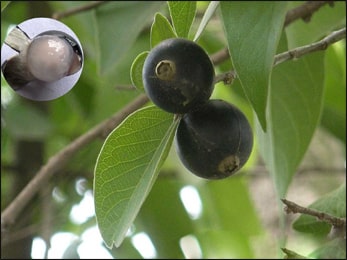Ankol (Alangium Salvifolium) - Properties, Benefits & Dosage

Ankol is abundantly found in India. It is a plant of great medicinal value and is often used for the treatment of gut and its related disorders. The herb is also popular because of its role in the natural treatment of Rabies viral infection, which spreads after a rabid dog bite.
It has good carminative and laxative properties which makes it very useful in the management of day to day gastric problems like bloating, belching, and flatulence etc.
Ankol belongs to Alangiacea family and the Latin name of the plant is Alangium salvifolium.
Common Synonyms of Ankol
- English name – Sage leaved Alangium.
- Hindi name – Dhera, Ankol.
- Sanskrit name – Ankot, Deerghakeela, Ankola, Nikochaka, Peetasara, Tamraphala, Hundika, Rudamallika, Kotara, Gudhapatra, Madana, Rechi, Gandhapushpa, Bhusita, Irikilla, Guptasneha etc.
- Marathi Name – Ankol.
- Gujarati name – Ankol.
- Tamil name – Elangi, Alandi.
- Kannada Name – Ankola.
- Bengali name – Aankod, Badh Aankod.
Occurrence
Ankol is a highly useful tree where all parts of the plant serve some or the other medicinal purpose. Its roots, bark, seeds, oil and fruits are all very useful for the body.
Ankol tree is common in the dry regions of India and around the Northern plains. It also grows in parts of Africa, Sri Lanka and China.
Properties
- GUNA (Characteristics): Laghu (Light), Snigdha (Smooth), Teekshna (Strong, Piercing)
- RASA (Taste): Tikta (Bitter), Katu (Pungent), Kashaya (Astringent)
- VIPAKA (After Taste that Develops Post Digestion): Katu (Pungent)
- VIRYA (Potency): Ushna (Hot Potency)
- Effect on Tridosha: Balances Kapha & Pitta dosha.
Special Activity
Ankol is well known for its effectiveness in the natural treatment and management of Rabies. It is also used to induce vomiting and purgation when conducting vamana and virechana karma during tedious Panchkarma procedures.
It helps in balancing Kapha and Pitta body energies given its properties.
Common Properties of the Herb
Different parts of Ankola plant have got separate medicinal value.
- The fruit has coolant properties and can be taken to relieve internal burning sensation and gut heat. It also improves immunity and overall strength and stamina.
- Problems like gastritis, sore throat, laryngitis etc which usually occur due to pitta vitiation are easily cured with the use of Ankola fruit.
- The seeds and oil are used to treat digestive problems and intestinal colics due to related conditions. Due to the kapha balancing properties of Ankola, it helps to relieve edema and psychological disorders while helping to improve in case of psychological disorders and edema.
- In the treatment of not only dog bite but also snake, rat and rodent bites also, seeds and oil of Ankola tree is very useful.
- The oil if Ankola tree is especially good for improving skin texture and complexion when used externally on the skin. It is also good for the management of oral disorders, bleeding problems both external as well as internal etc.
- The anti-inflammatory action of Ankola makes it useful in treating diabetes, epilepsy and other painful conditions of the body.
- Ankola root bark works well in case of common cold, influenza and fever.
- In case of dogbite, Ankol root bark powder is given to the patient with milk, two to three times a day. It is also effective in rat bite, snake bite and spider bite also.
- The herb is good for liver detoxification and can help in treating diarrhea, Irritable bowel syndrome etc.
- Ankol oil is a very good aphrodisiac and rejuvenating preparation. It can be applied to the navel if one is having problems like Premature Ejaculation. Its fruits are also good and give better results in case of impotency and male reproductive system problems.
- It can be given to relieve headache as well.
A word of caution
Ankol plant parts are highly purgative and may induce vomiting in case of over dosage. Therefore, care should be taken if symptoms like severe burning, stomach upset, vertigo and insomnia etc. occur.
In such a scenario, Shankhapushpi (Convolvulus pluricaulis) should be given with milk to counter its side effects.
Ankol should be avoided in all forms at the time of pregnancy or during breast feeding.
Dosage
The maximum dosage for the plant should not exceed 2g.
- Root bark powder – 125 – 2000mg.
- Leaves – less than 2g.
- Fruits – less than 2 g.
- Seeds – less than 2 g.
- Ankol oil – 2 to 15 drops.



